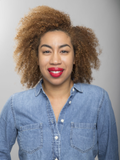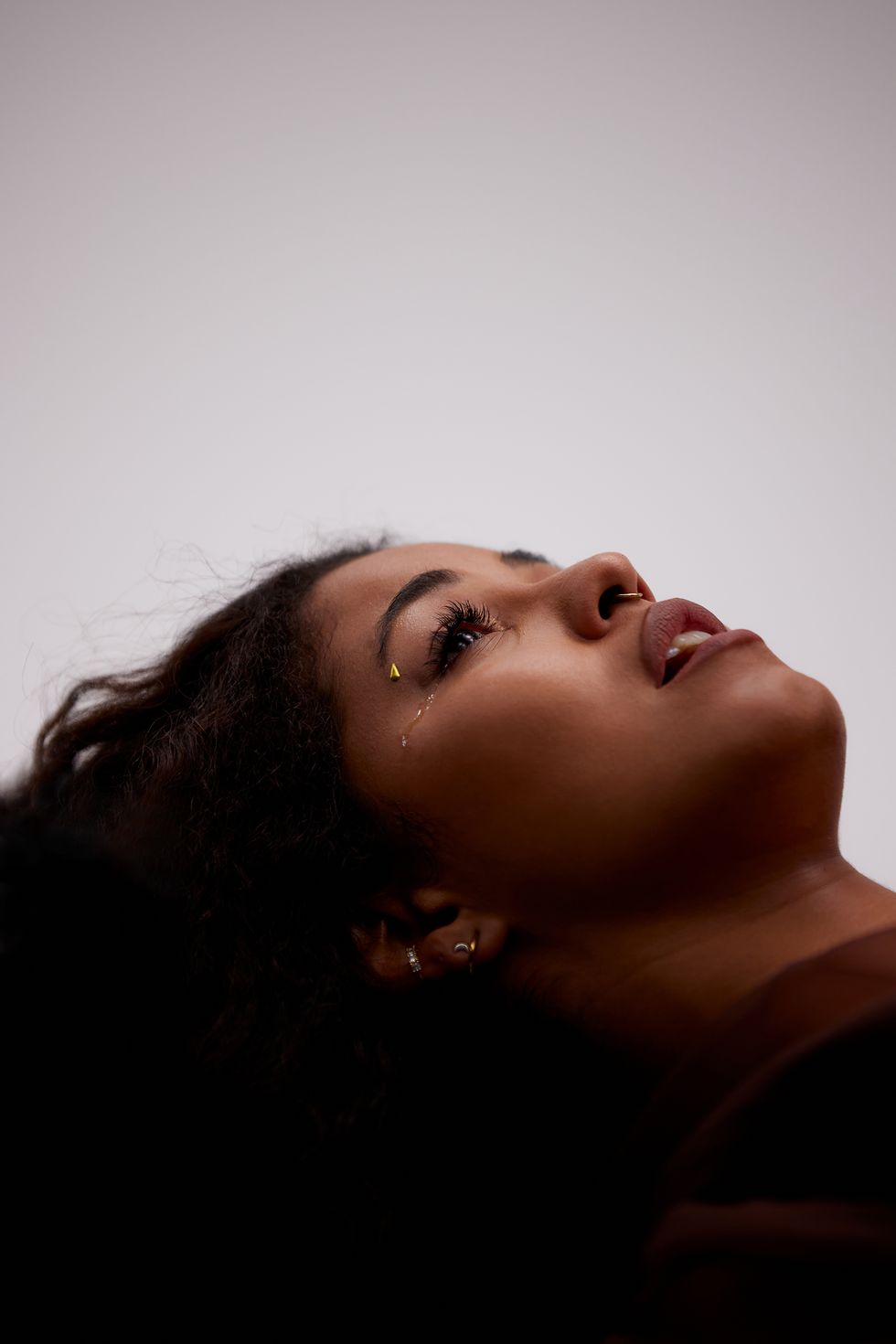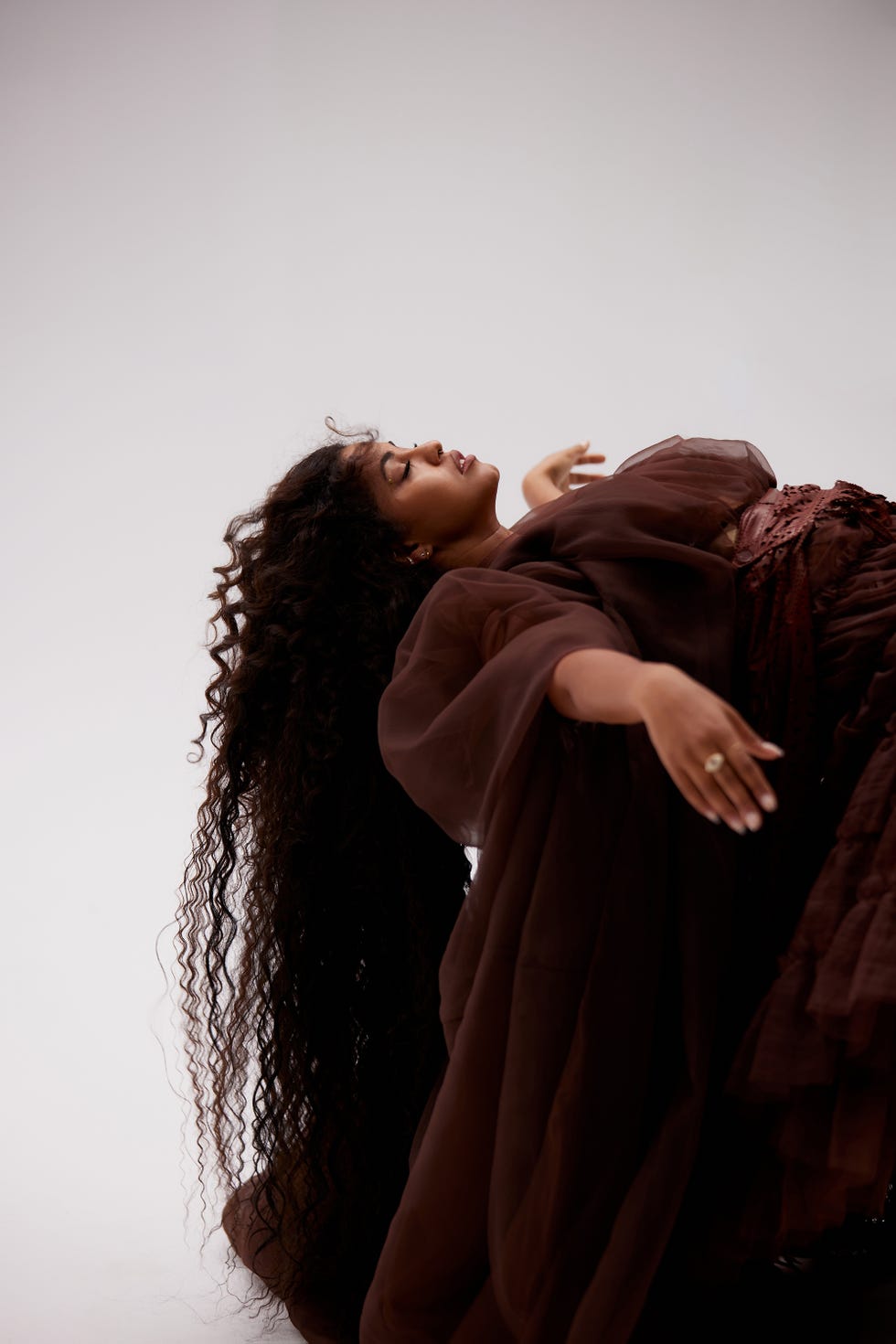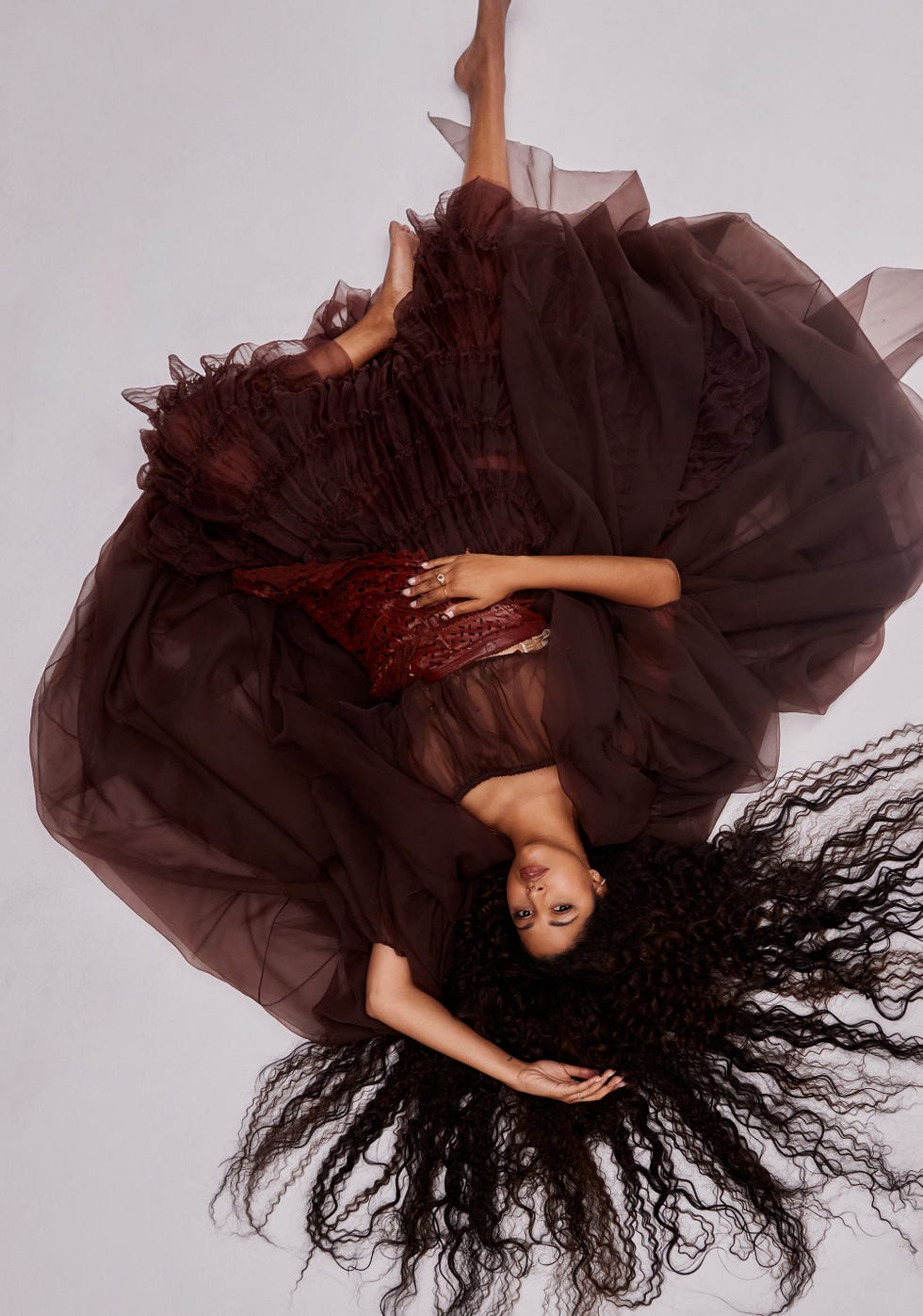Yendry Contains Multitudes and So Does Her Music
Yendry is a mosaic of the life experiences, countries, customs, and languages that have shaped her. The Dominican-born, Italian-raised, musician (who speaks Spanish, Italian, and English) has been on the rise since 2019, laying down deeply autobiographical lyrics over hypnotizing beats, across genres like electronica, experimental pop, R&B en Español, dembow, and bachata. Yendry bares it all in her songs and her storytelling goes to emotionally raw places: revenge against abusive and toxic husbands (“Barrio”), immigrant mothers and their difficult sacrifices (“Nena”), and humbling dudes who can’t accept rejection (“El Diablo”).
The singer-songwriter, 29, was born Yendry Cony Fiorentino in Herrera, Santo Domingo to Dominican parents. At age three, her single mom, then 26, left for Italy. Yendry was left with her maternal grandmother and 13 uncles, ailing from the absence and trauma of missing her mother. Yendry’s mom returned the following year and brought her daughter to Turin, where she later remarried an Italian man and had sons. Although raised in Italy, Yendry is a daughter of the Dominican diaspora; her relationship with her Dominican culture and roots are organic and on her terms. Through songs and in life, she navigates the fragments of her identity—like being a Caribbean immigrant, the racism and xenophobia she and her mother encountered in Europe, and the complicated nuances of living between two cultures.
She grew up listening to traditional Dominican musical genres, like merengue and bachata, while also being sonically influenced by Radiohead, FKA Twigs, Ella Fitzgerald, Nina Simone, James Blake, and SZA. Her first ballad and latest single, “La Puerta,” is an ethereal and tender ode to her beloved Italian grandfather who passed away in 2021.
More From ELLE

For her debut album, slated for a fall 2023 release, her eclectic sonic choices, and her self-described “grown woman” songwriting, are coming full circle. Yendry’s past collaborations with reggae icon Damian “Jr. Gong” Marley on the very flirty “You,” Congolese-Belgian performer Lous and the Yakuza on the sensual track “Masquerade,” and British-Nigerian rapper Enny on the pulsating “Kiki” have further cemented her talents. And they keep us intrigued for more potential artist features on her debut.
In early May, over Zoom from Los Angeles, Yendry is dressed in a scoop-neck black top and slick jewelry, looking cool and candid. She talks thoughtfully about her Dominican roots, “the childbirth” of her forthcoming debut album, losing her filter as she approaches 30, and the boss moves she’s making as a global artist.
Your latest single, “La Puerta,” is a ballad about grief and family. What’s the personal story behind it?
This song has a very deep story behind It. I wrote it two years ago with Vicente Barco, he’s a Colombian artist and songwriter. I love working with him. I don’t work with a lot of people on writing because it’s a very personal thing. So I wrote “La Puerta” after my grandpa passed away. He passed away on April 18th, two years ago, and I wrote the song that June, so I was still grieving. The producer, Fede [Federico] Vindver, took a guitar and he started these two chords. The song is very simple, very intimate. I kept it very neutral, the hook is like, “A veces pienso / Si una foto fuera más que un recuerdo / Como una puerta que se puede abrir / Entrar por un abrazo y salir…” I remember I didn’t get the chance to say goodbye to my grandpa ‘cause I was here in the U.S. and he was in Italy. They just called me and they told me and I’m like, “Fuck.” I’m literally spending my whole life sacrificing and just focused on my job. My parents, my family, they’re getting older. And that kind of hit me, ‘cause I didn’t get the chance to say goodbye. So when I wrote the song, I kept it very generic ‘cause I wanted people to relate. I think it can be about someone in your family, it can be a lover. Even English-speaking people that listen to it and don’t understand completely still got goosebumps. That’s the feedback I had.
This content is imported from youTube. You may be able to find the same content in another format, or you may be able to find more information, at their web site.
And “Herrera”, your first bachata single, is the name of the barrio in Santo Domingo you were born in. It’s a love letter to your Dominicanidad and your hometown. Did you feel any pressure? Especially with making a bachata that’s authentically you?
Yes! A lot of pressure. [Laughs] No, but I gotta say the pressure came more from myself because I grew up listening to bachata. I actually have a public playlist on Spotify, with all my favorite bachatas that I grew up with, like Monchy & Alexandra, Juan Luis Guerra, Yoskar Sarante, Frank Reyes. Growing up with a very established and old-school genre, it was very tricky for me to make my own version of it. When I made the bachata some time ago, I started it with the UK producer [Moon Willis], and he really didn’t know about bachata. But, he told me he just bought a bachata guitar, and he was studying different folkloristic genres around the world. I started the bachata with him and then I felt like, “ah, man, I don’t know if I can touch this.” I went to look for a Dominican bachatero guitarist, Yasser Tejeda. If we’re making a bachata, I know I’m gonna have my own vocals and lyrics, which are a little bit more pop. At the same time I want the guitar to be there, which is the principal element. I want the beat to be exactly a bachata. It needs to be danceable, it needs to have all the things that I fell in love with a bachata for. I was scared, ‘cause I was like, “Yendry, you’re gonna fuck this up.” But I always put a lot of pressure on myself. I learned how to live with it. And it’s actually one of those songs that I listen to, which is weird, ‘cause I usually don’t listen to my own music. I love it ‘cause it’s very passionate. It’s about the start of a love story, and I happened to be in that exact moment of my life. And I wanted it to be that, because, you know, bachatas are really dramatic.
This content is imported from youTube. You may be able to find the same content in another format, or you may be able to find more information, at their web site.
You’ve shot many projects in DR (music videos for “Se Acabo” and “En El Patio”), and you continue with “Herrera.” Even though you were raised in Italy, there isn’t one way to be Dominican. Can you talk about showcasing your Dominican culture to the world?
I grew up between Italy and the DR, but every time I would go to DR, I’m from the capital [Santo Domingo], I’d just stay in my grandma’s house, with my aunties coming over, and all my cousins, we’re like forty-two cousins… I haven’t seen much of the island. When I was 20 I was like, “Okay Mom, I’m going back to DR by myself, ‘cause I need to figure out what’s going on with me, and why I feel so different in Italy, in a white society that’s very old-minded as it is.” I’ve always been like the only Dominican girl in the school, the only Dominican girl in town. I never felt that sense of community, with other communities in Italy. I’m like, “I gotta go and figure out what’s going on and who I am.” I went to visit everything, Cabrera, Bayahibe, Las Terrenas—I did all the rounds. When I landed in DR, by myself, I felt at home. I was like, “Wait, this is where I’m supposed to be.” It’s something I can’t really explain, maybe it comes from your ancestors. Where I come from, I’m not afraid to talk about, “Oh I’m from the hood in DR.” Yo soy de Herrera. I’m a hustler in life, and it’s not because you grow up in Italy that you’re like, “I’m cool, I’m chilling.” I had to change schools twice because of racism. I’ve been struggling with my identity, and to be accepted and to find a community. There’s a lot of shit that you bring from being, obviously, an immigrant child. When I did COLORS, a lot of Dominican girls texted me, “You know what is cool about you? You show up with your curls, and you look like me, and I don’t have many references for that in the world.” And I’m like, okay, this is getting bigger than I thought.
This content is imported from youTube. You may be able to find the same content in another format, or you may be able to find more information, at their web site.
You’ve made unpredictable sonic choices in your career so far; dembow, bachata, electronica, alt Latin pop, and more. What sounds can we expect on your upcoming debut?
Everything! [Laughs] I think growing up between two cultures really gave me this open-minded approach to everything. My favorite artists as well, like OutKast, they had a big variety of things. I never wanted to put myself in a box. So, if I have to have this job, I have to enjoy it, and just experiment and do what I like. On the album there will be a mix of different genres, which is characteristic of my music, big basses, strong melodies, and choir arrangements. I’m talking a lot about the struggle to find yourself at home when you’re traveling a lot, and you have a mixed cultural background. I want it to represent me 100 percent, so I’m sharing a lot of what I’ve been experiencing in the last two years. I also like to do everything myself, like finding the melodies. I love when they get together and they overlap, you know, Frank Ocean style. And I tap into different—I wouldn’t say cultures, but different vibes. An Afrobeats song, obviously the bachata, there’s a rap song, because I rap as well and I grew up with that. If my first album has to be what I present myself to the world, I want it to be everything I am. I see it as childbirth.
From the very start with songs like “Barrio” and “Nena,” you’ve been a storyteller who’s connecting the dots between DR and Italy, and pulling us closer in to listen. What stories are you telling in your forthcoming debut project?
I started talking about things that I was closer to, like my mom’s story. Sometimes I would put a little bit of my mom’s story and my aunt’s story. We’re sponges, so you just get whatever you grow up with. In this album I’m talking more about myself and how I’m feeling. I’ve been traveling around the world for three years now, not having a house or a base. When I go back to Italy, I don’t really feel like that’s my home anymore ‘cause I’m growing. There’s a big difference between what I’m trying to do, and what my friends want to achieve in life, which isn’t bigger, it’s just different in terms of wavelength. They’re more into the slow life and I’m more like, “Okay, let’s go, I gotta play Lollapalooza!” [Laughs]
I’m talking about these struggles, and I feel like my project is really talking to that young generation, that mixed-culture generation, that don’t feel like they fit. ‘Cause that’s how I feel. When I’m in L.A., it’s like I don’t fit into this culture. In New York, I feel closer to the culture, but I don’t really fit. In DR, I’m still gonna be the Italian girl for them. When I’m in Italy, I’m still the Dominican girl, so I’m in this limbo [where] you have to figure out yourself and just create your own community. I would say a big message of my project is: If you feel like a weirdo, ‘cause you ended up speaking three languages and listening to Stevie Wonder, Aphex Twin, and Juan Luis Guerra, that’s okay. That richness isn’t something wrong with you. ‘Cause as a teenager I thought it was something wrong with me and now I accepted it and I made it my own art. Those are the topics, and also as a woman, I always try to talk about women’s empowerment, and just things that people don’t feel comfortable talking about. Like, domestic abuse, immigrant mothers, and periods.
You’ve collaborated with a lot of Caribbean folks: Damian Marley, and music video directors, Kieran Khan (“Ya,” “You”) and Dior Rodriguez (“Herrera”). As a Caribeña, talk to me about this importance.
I feel like sometimes we usually give props to other types of people, because of how society was built before us. If I’m shooting a video in DR, I want it to be someone from here, that knows the island, and knows how it works to shoot a video down here, ‘cause it’s completely different. There’s a lot of talent on the island as well. I do it even with designers. When I had my concert there [Isle of Light music festival in DR], I asked my friend who’s a designer [Mánnelik Ortega Morel] in Santo Domingo to help me with the outfit. It’s cool to give props to the locals, you know? ‘Cause I feel like as an artist you almost have a responsibility doing that. If I have a bigger platform, and it’s not huge, but whatever I can do, I wanna do it. Because at the end of the day, that’s what we’re leaving behind.
Your year is packed with music festivals, and coming up there’s SummerStage in New York, Lollapalooza Berlin, and more. How do you feel that you’re becoming a stronger performer?
That’s really like a gym, it’s really like training. I feel like I was already a live performance artist coming from a jazz manouche background. I had to perform in front of like five people. That’s the hardest thing to do, ‘cause they’re just in silence waiting. It’s like, “Let’s see what she does.” [Laughs] Then with the other band [Materianera, Yendry’s former group], I remember we used to go around Italy by car and sometimes bring our own equipment, cables, and stuff. I used to do all of that by myself. Now it feels crazy; you get there, and there’s already someone taking care of it, it’s like a luxury for me. Live music is the reason why I do what I do. I feel like that gives me energy and motivation to go on. My project kind of exploded during quarantine, so I didn’t get the chance to have a reaction from the audience. Even when people started to recognize me in the streets, I didn’t realize it, because of Covid.
You turn 30 in July and have achieved major milestones in your twenties so far. What do you feel is next?
Girl, I’m a grown woman now! [Laughs] I feel like before, I had a filter, and now I just like, talk, you know?… Can I just say whatever comes to me? Sometimes, I’m just like at these corporate meetings and I’m like, “I gotta go change my pad.” [Laughs] I’m way more confident with my body. I feel like growing up in Italy as a Dominican, I’ve always been like this object, I’ve always been like exotic for them. I didn’t wanna end up in the stereotype that I was like an easy girl just because of how I was dressed.
I used to be like a Billie Eilish type. Everything was super large because I didn’t wanna show my curves, I didn’t wanna put my beauty in front, and I wanted people to judge me for who I was instead of how I looked. Now, I’m just like, “Listen, I’m not wearing a bra just because it makes you feel uncomfortable, like, I can’t breathe so…” I’m getting more confident on that side and I’ve been through a lot in terms of my job and my life experiences. I don’t like wasting my time, I have less patience. I’m more selective with who I spend my time with. And the last thing is that I’m more confident with my own ideas. Even the “La Puerta” video, I directed it with my friend [Alberto Chimenti Dezani], and I was like, “This is what I like, this is what I envision.” Before, I would’ve been like, “Oh, I had this idea, but I’m not sure…” Now it’s more like, “This is how I see it, and if we fuck it up, we fuck it up.” But I’m way more open to get into it and trust my own ideas.
I love that. I saw that you co-directed Kiki as well, and I saw you co-write all of your songs. So, for me, with your songwriting, and co-directing your music videos, it’s about ownership.
It’s my career, which means it’s my life. ‘Cause this thing doesn’t give you a personal life. So I’m like, if it’s gonna be that way, then I have to be across everything. It’s my music, my lyrics, my own experiences that I’m putting out.
This interview has been edited and condensed.

Jasmin Hernandez is a Black Dominican Yorker based in Harlem, New York. She is an author and founder of Gallery Gurls, which reps for BIPOC in the art world.




